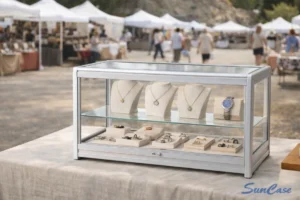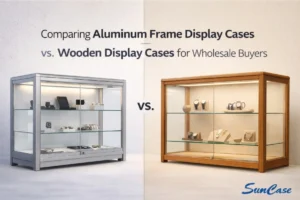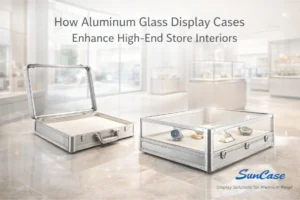All You Need to Know About Aluminum Cases

Aluminum cases provide versatile protective solutions for sensitive equipment and components across countless industries and applications. Their unmatched balance of strength, durability, thermal dissipation, customization flexibility, and cost savings make aluminum cases the practical choice over alternate materials.
- Aluminum optimizes strength, weight, and cost
- Fabricated and cast construction options
- Custom layouts facilitate access and usability
- Proper selection ensures reliable protection
When performance, specifications, and budget matter, aluminum enclosures check all the boxes. This guide will cover aluminum casing advantages, types, configurations and selection criteria key to leveraging their benefits.
Let’s review how securing components inside aluminum aligns with reliability and value objectives.
Why Aluminum for Cases?
Before reviewing aluminum case varieties and configurations, it helps to understand why aluminum is well-suited for protective enclosures in the first place. Key intrinsic benefits aluminum provides include:
- Lightweight
- Strong and rigid
- Resistant to corrosion
- Easy to fabricate
- Thermal conductive Non-magnetic
At around 168 pounds per cubic foot, aluminum weighs far less than competing metals like steel or brass. Yet, on a strength-to-weight basis, aluminum alloys match or even exceed the physical properties of low-carbon steel. This potent combination makes aluminum enclosures easy to handle and mount without compromising ruggedness.
Aluminum’s natural top layer of aluminum oxide withstands environmental and chemical exposure better than steel or iron. With proper surface treatments, aluminum cases deliver decades of reliable corrosion resistance, even in salty or humid atmospheres.
Aluminum Case Types
There are several types of aluminum cases available out there for different purposes, such as
Coin Cases
Numismatists and casual collectors alike secure prized coins in aluminum coin cases that prevent corrosion and handling damage. Capsules showcase details while high-density foam safely holds coins in place. Cases feature security locks and stack together for organized storage.
Grooming Cases
Professionals tote durable yet stylish aluminum grooming cases to house all their beauty essentials. Customized interiors keep delicate tools properly stowed and separated. Soft finishes protect fine implements like scissors and clippers. Cases withstand salon settings and travel while presenting a polished image.
Gun Cases
Firearm enthusiasts demand rugged aluminum gun cases that fully protect their investments from dents, dust and moisture. Pick-N-Pluck foam interiors cradle guns safely. Pressure equalization valves prevent condensation. Automotive-style locks thwart prying hands.
Sports Card Cases
Collectible and trading card connoisseurs preserve pristine card condition inside aluminum cases. Felt-lined compartments partition delicate cards while mitigating friction. Clear lids allow display without direct handling. Locking briefcases deter tampering and block UV light exposure during storage.
Tool Cases
Aluminum tool cases travel anywhere – job site or hobby bench – keeping bits and implements organized yet accessible. Interior trays have custom cutouts for each tool. Durable exteriors resist worksite abuse. Extended handles facilitate carrying.
Flight Cases
Heavy-duty aluminum flight cases meet stringent requirements for protecting fragile music and production gear on the road. Reinforced corners, pressure equalization, and specialty latches safeguard sensitive electronics through extreme transport conditions.
Instrument Cases
Whether string, brass or percussion, custom aluminum instrument cases deliver trusted protection for delicate tools-of-the-trade. Plush-lined interiors cradle instruments while suspended mounts isolate them from shocks and vibration. Durable exteriors ensure safe passage in overhead storage and busy venues.
Key Features and Benefits
Beyond case construction methods, customized aluminum enclosures offer a spectrum of possible features and openings to facilitate access, user interaction, and connectivity. Common aluminum briefcase attributes include:
- External Mounting Provisions: Tapped holes, flanges, and slots accept bolts/fasteners, securing the case to surrounding structures and surfaces.
- Venting/Aeration Openings: Cuts, holes, and grilles promote passive or active airflow through the enclosure to ventilate and cool interior components.
- Cables/Wire Access: Cutouts and strain relief slots allow wiring and cables to enter and exit the enclosure housing.
- Doors/Panels: Hinged doors or removable access panels and windows facilitate service, upgrades and assembly through partial case disassembly rather than fully removing the cover.
Learn More About Advantages of Aluminum Case >>
Basic Aluminum Case Structure
While aluminum attache case designs widely vary, most share common structural traits. Basic enclosure anatomy includes the cover/housing, frame, mounting points, and access panels.
The cover makes up the top portion of the enclosure. This removable section allows internal access once detached from the bottom frame. Covers may feature vent holes, transparent windows, or hinged access doors depending on requirements.
The frame forms the foundational shell for the entire assembly. This includes the enclosure bottom as well as any side and front/rear vertical profiles. Frames may be fabricated from aluminum sheets or extrusions fastened into shapes. The cover mounts to the frame.
Mounting flanges extend from the frame perimeter. These flat tabs contain holes for inserting fastener hardware to anchor the entire case to mounting racks, vehicles or other structures.
Access panels/doors allow partial disassembly for servicing internal components without fully detaching the entire cover. These save time for upgrades and maintenance.
FAQ about Aluminum Cases
- Do aluminum cases require special maintenance?
- Aluminum finishes stand up well to environmental exposure. However, chemical cleaning solutions can damage protective coatings and alter the surface over time. Instead, clean aluminum cases with water containing a mild detergent and avoid harsh solvents.
- Can aluminum cases be repaired if damaged?
- It depends on enclosure construction. Fabricated cases allow replacing individual damaged panels. Cast aluminum cases with cracks or fractures are harder to mend, often requiring welding/refinishing or full replacements. Protect cases further with resilient outer coatings.
- Why not use stainless steel vs aluminum?
- Stainless provides excellent corrosion performance. But aluminum actually rivals stainless steel while costing far less, weighing less, and remaining easier to fabricate. Aluminum makes the most sense for the balance of cost, weight and corrosion resistance over ferrous alloys.
- How To Choose an Aluminum Case?
- When choosing an aluminum case, consider factors like size, material thickness, sealing features, and storage solutions. Assess frequent use cases and think about materials & construction variables like waterproofing, shock resistance, and custom compartments. Premium details such as RFID blocking, built-in locks, and ergonomic handles can enhance security and usability.
Conclusion
By understanding versatile aluminum tool case construction methods, features, and selection criteria covered here, you’ll be well-equipped to choose enclosures tailored for your protection needs. Whether safeguarding sensitive electronics or ruggedizing tools and machinery, aluminum brings industry-leading durability without premium cost or permanent weight penalties.
For expert guidance dialing in aluminum enclosure solutions for your specific requirements and operating conditions, the specialists at SUN Case Supply offer complimentary engineering assessment services.



